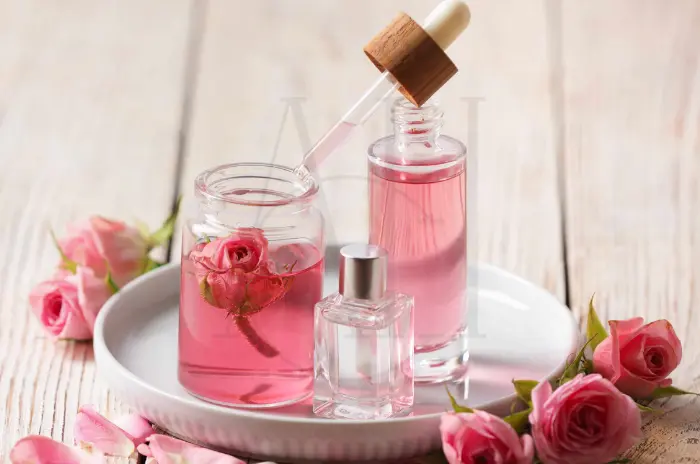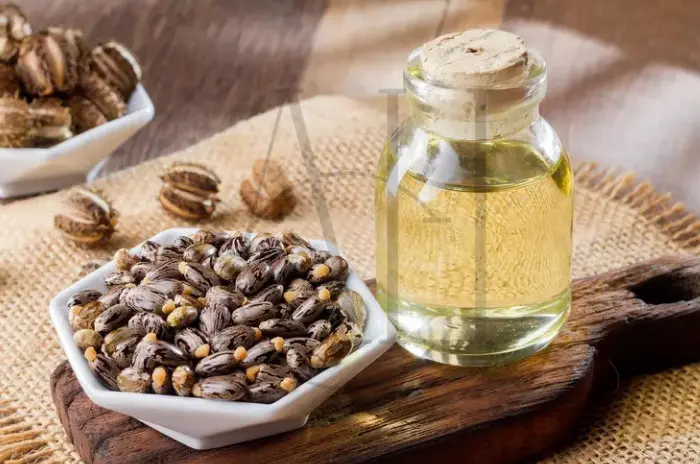Rose water for hair has become a cornerstone ingredient in natural beauty routines worldwide, offering a gentle yet powerful solution for various hair and scalp concerns. This aromatic liquid, distilled from the petals of Rosa Damascena or Damask roses, carries centuries of tradition combined with modern scientific validation. The rose water hair benefits extend from promoting scalp health to enhancing shine, managing oil production, and supporting overall hair vitality.
Table of Contents
ToggleWhat is Rose Water and Its Origins
Rose water is a fragrant hydrosol produced through the steam distillation of fresh rose petals, most commonly from Damask roses cultivated in regions like Iran, Bulgaria, Turkey, and Morocco. This ancient beauty elixir has been treasured for over a millennium, with its rose water origin tracing back to 10th-century Persia where the renowned physician Avicenna perfected the distillation technique.
The creation of Avicenna rose water marked a significant advancement in both medicine and cosmetics. Persian scholars discovered that capturing the essence of roses in water form preserved the flower’s beneficial properties while creating a stable, usable product. This innovation spread along trade routes, becoming integral to beauty rituals across Middle Eastern, Mediterranean, and South Asian cultures.
Rose water nutrients include vitamins A, C, D, E, and B3, along with powerful antioxidants like flavonoids and phenolic compounds. These bioactive elements work synergistically to nourish hair follicles, strengthen strands, and maintain scalp equilibrium. The natural pH of rose water, typically between 4.5 and 5.5, closely matches the scalp’s ideal pH level, making it exceptionally compatible with human skin and hair.
DIY Rose Water Recipe for Hair
Creating your own rose water for hair at home ensures purity, freshness, and cost-effectiveness while allowing you to control the quality of ingredients. This simple process requires minimal equipment and produces a product comparable to commercial preparations.
To make homemade rose water hair rinse, you’ll need fresh or dried organic rose petals (2-3 cups), distilled water (4 cups), a large pot with a lid, a heat-safe bowl, and clean glass bottles for storage. Always choose pesticide-free roses, as conventional flowers may contain harmful chemicals unsuitable for skin contact.
Place the rose petals in the pot and cover them with distilled water. Position a heat-safe bowl in the center of the pot, resting on top of the petals. Invert the pot lid so the handle points downward into the bowl. Bring the water to a gentle simmer over medium heat. As steam rises, it will condense on the inverted lid and drip into the central bowl, creating pure rose water for hair. Continue this process for 20-30 minutes.
For a quicker alternative, steep 2 cups of fresh rose petals in 3 cups of boiling distilled water, cover and allow to cool for 30-45 minutes, then strain through cheesecloth. This method produces a lighter rose water hair rinse suitable for daily use.
Rose Water for Dandruff and Scalp Health
Rose water for hair offers exceptional benefits for managing dandruff and promoting overall scalp benefits through its natural anti-fungal, anti-inflammatory, and pH-balancing properties. Dandruff, often caused by an overgrowth of Malassezia fungus, scalp dryness, or seborrheic dermatitis, responds well to rose water’s gentle yet effective therapeutic action.
The anti-inflammatory compounds in rose water for hair soothe irritated scalp tissue, reducing the redness, itching, and flaking associated with dandruff. Unlike harsh chemical treatments that can further irritate sensitive skin, rose water provides relief without disrupting the scalp’s natural protective barrier. Rose water nutrients including vitamin C and natural acids help regulate cellular turnover on the scalp, preventing the excessive shedding of skin cells.
For effective dandruff treatment, apply pure rose water for hair directly to your scalp using a cotton pad or spray bottle. Part your hair in sections and apply generously, focusing on affected areas. Massage gently with fingertips using circular motions for 3-5 minutes to enhance absorption and stimulate circulation.

Benefits of Rose Water for Scalp and Hair
The comprehensive rose water benefits for hair extend far beyond addressing specific problems, offering holistic nourishment that enhances overall hair health, appearance, and manageability.
Rose water for hair delivers lightweight hydration that penetrates the hair shaft without leaving greasy residue. The humectant properties attract and retain moisture, keeping hair hydrates hair throughout the day. This sustained hydration improves elasticity, reducing breakage and split ends significantly. The molecular structure allows it to deliver rose water nutrients directly to the cortex where they strengthen internal bonds.
Rose water hair benefits include significant restorative capabilities for damaged hair. The antioxidants combat free radical damage from UV exposure, pollution, and heat styling, while vitamins support collagen production essential for maintaining hair structure. This repair hair damage action helps restore compromised strands over time. The pH-balancing effect smooths raised cuticles caused by alkaline products.
For those struggling with unruly hair, rose water for hair provides natural frizz management. The lightweight coating action reduces frizz by smoothing the cuticle and neutralizing static electricity. Unlike heavy silicones, rose water doesn’t build up, allowing for long-term use without diminishing effectiveness.
Massaging rose water for hair into the scalp stimulates blood flow to hair follicles, delivering increased oxygen and nutrients necessary for optimal growth. The anti-inflammatory properties protect follicles from oxidative stress, supporting rose water for hair growth by extending the active growth phase.
Rose Water Hair Rinse for Scalp Care
A rose water hair rinse represents one of the most effective yet simple methods for incorporating rose water benefits for hair into your routine. This traditional application method delivers concentrated scalp benefits while adding shine and manageability.
To create an effective rose water hair rinse, dilute pure rose water with an equal amount of distilled water for normal to dry hair types. For oily hair, use rose water at full strength to maximize astringent benefits. Prepare approximately 2 cups of rinse solution, adjusting based on hair length.
After shampooing and conditioning, rinse your hair thoroughly with cool water. Slowly pour the rose water hair rinse over your scalp and hair, working from roots to ends. Use your fingertips to gently massage the rinse into your scalp using circular motions for 2-3 minutes.
Leave the rose water for hair rinse in without rinsing out—this is a leave-in treatment. The lightweight nature means it won’t weigh hair down but will continue delivering rose water nutrients as hair dries. Gently squeeze out excess liquid and proceed with styling.
For optimal results, incorporate this rinse 2-3 times weekly after shampooing. Hair will appear shinier and feel softer after the first use, with cumulative benefits increasing over 4-6 weeks. The rose water hair rinse method is particularly effective for achieving rose water for shiny hair without heavy products.
Rose Water for Oily Scalp and Hair
Managing excessive oil production is a primary concern for many, and rose water for oily scalp offers a natural solution that controls oily scalp without triggering the rebound effect common with harsh clarifying products.
Overactive sebaceous glands produce excess sebum in response to various triggers including hormonal fluctuations, genetics, and over-cleansing. When aggressive products strip all oil from the scalp, glands compensate by producing even more. Rose water for hair breaks this cycle through gentle regulation.
The natural astringent properties of rose water for oily scalp help tighten pores and normalize sebaceous gland activity. This regulation occurs gradually, training glands to produce appropriate amounts of oil. The pH-balancing effect also contributes to sebum regulation.
For effective oil control, apply rose water for hair directly to the scalp as a daily toner. After parting hair in sections, use a cotton pad saturated with pure rose water to dab along the scalp, focusing on the greasiest areas. Allow to air dry completely. Alternatively, fill a spray bottle with undiluted rose water for oily scalp and mist the roots each morning.
Most users notice reduced oil production within 2-3 weeks of daily use, with optimal results appearing after 6-8 weeks. This natural approach controls oily scalp sustainably without harsh side effects.
How to Use Rose Water Shampoo and Conditioner
Incorporating rose water for hair into cleansing and conditioning products amplifies rose water hair benefits while streamlining your routine. Whether choosing commercial formulations or creating DIY versions, understanding proper usage maximizes results.
When shopping for rose water-infused hair care, examine ingredient lists carefully. Rose water for hair should appear among the first five ingredients. Avoid products listing “rose fragrance” instead of actual rose water—these synthetic alternatives lack the therapeutic rose water nutrients. Quality products should be sulfate-free.
Create your own shampoo by mixing 1/4 cup of castile soap with 1/4 cup of rose water, 1 teaspoon of jojoba oil, and 10 drops of lavender essential oil. Apply to wet hair, focusing on the scalp, and massage gently for 2-3 minutes.
For a nourishing conditioner, blend 1/2 cup of rose water with 2 tablespoons of coconut milk, 1 tablespoon of honey, and 5 drops of rosemary essential oil. This mixture hydrates hair while providing slip for detangling. Apply to mid-lengths and ends, leave on for 5-10 minutes, then rinse with cool water.
Regular use of rose water shampoo and conditioner creates cumulative benefits, with hair becoming progressively shinier, stronger, and more manageable over time.
Benefits Of Rose Water For Hair Care and Scalp Health – FAQ
How can I easily make rose water at home?
Simmer 2-3 cups of fresh organic rose petals in distilled water for 30 minutes, strain the liquid, and store the cooled rose water for hair in a glass bottle in the refrigerator.
Does rose water help eliminate stubborn dandruff flakes?
Yes, rose water for hair contains anti-fungal and anti-inflammatory properties that reduce fungus overgrowth and soothe scalp irritation, effectively addressing dandruff causes.
How often should a rose water hair rinse be used?
Use a rose water hair rinse 2-3 times weekly after shampooing for general maintenance, or daily as a scalp toner for oily scalp or dandruff concerns.
Is rose water effective for regulating an oily scalp?
Absolutely, rose water for oily scalp works as a natural astringent that normalizes sebaceous gland activity and balances pH, reducing excess oil production without triggering rebound oiliness.




